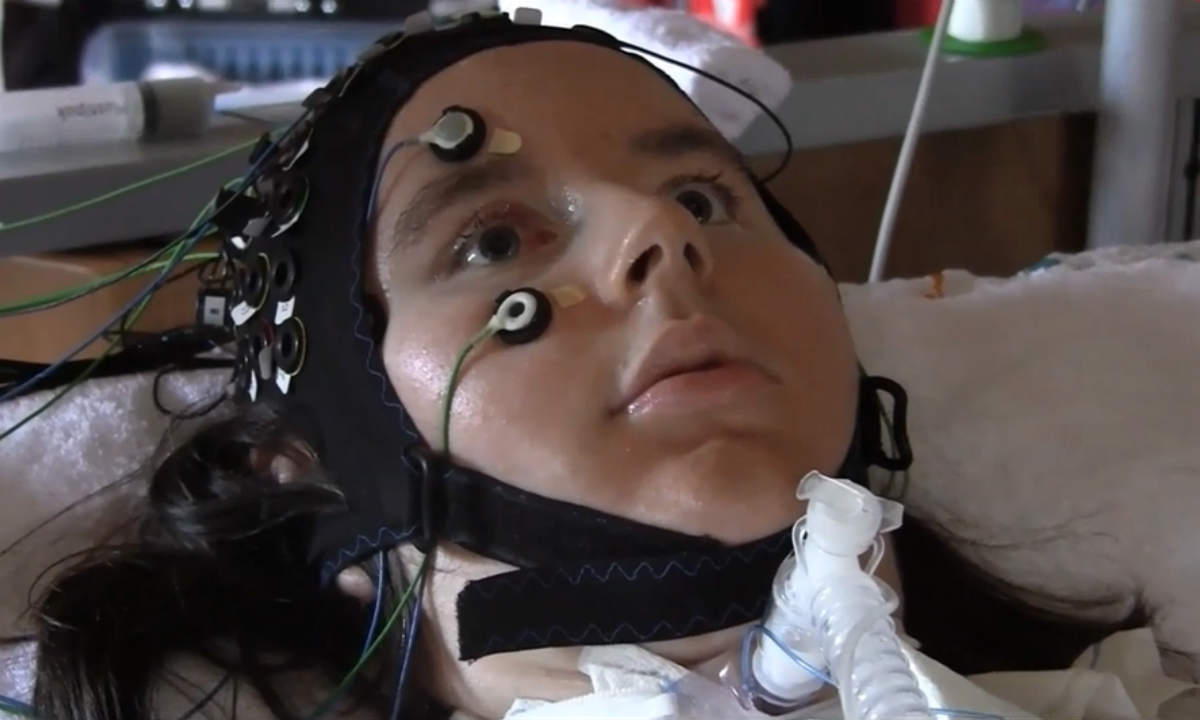
Brain-computer interface allows completely locked-in people to communicate
Completely locked-in participants report being “happy”
 A female participant in the locked-in study
A female participant in the locked-in study
A computer interface that can decipher the thoughts of people who are unable to communicate could revolutionize the lives of those living with completely locked-in syndrome, according to a paper published this week in PLOS Biology.
And contrary to expectations, the participants in the study reported being “happy,” despite their extreme condition. The research was conducted by a multinational team, led by Niels Birbaumer, at the Wyss Center for Bio and Neuroengineering in Geneva.
Patients suffering from complete paralysis, but with preserved awareness, cognition, and eye movements and blinking are classified as having locked-in syndrome. If eye movements are also lost, the condition is referred to as completely locked-in syndrome.
In the trial, patients with completely locked-in syndrome were able to respond “yes” or “no” to spoken questions, by thinking the answers. A non-invasive brain-computer interface detected their responses by measuring changes in blood oxygen levels in the brain.
The results overturn previous theories that postulate that people with completely locked-in syndrome lack the goal-directed thinking necessary to use a brain-computer interface and are, therefore, incapable of communication.
Extensive investigations were carried out in four patients with ALS (amyotrophic lateral sclerosis, also known as Lou Gehrig’s disease) — a progressive motor neuron disease that leads to complete destruction of the part of the nervous system responsible for movement.
The researchers asked personal questions with known answers and open questions that needed “yes” or “no” answers including: “Your husband’s name is Joachim?” and “Are you happy?” They found the questions elicited correct responses in 70% of the time.
Professor Birbaumer said: “The striking results overturn my own theory that people with completely locked-in syndrome are not capable of communication. We found that all four patients we tested were able to answer the personal questions we asked them, using their thoughts alone. If we can replicate this study in more patients, I believe we could restore useful communication in completely locked-in states for people with motor neuron diseases.”
The question “Are you happy?” resulted in a consistent “yes” response from the four people, repeated over weeks of questioning. Professor Birbaumer added:
“We were initially surprised at the positive responses when we questioned the four completely locked-in patients about their quality of life. All four had accepted artificial ventilation in order to sustain their life, when breathing became impossible; thus, in a sense, they had already chosen to live. What we observed was that as long as they received satisfactory care at home, they found their quality of life acceptable. It is for this reason, if we could make this technique widely clinically available, it could have a huge impact on the day-to-day life of people with completely locked-in syndrome.”
In one case, a family requested that the researchers asked one of the participants whether he would agree for his daughter to marry her boyfriend ‘Mario’. The answer was “no,” nine times out of ten.
The researchers conclude that this could mark “the first step towards abolition of complete locked-in states, at least for ALS”, if their results can be replicated.
https://www.bioedge.org/images/2008images/TH_locked-in.jpg
Creative commons
https://bioedge.org/wp-content/uploads/2021/09/FB_locked-in.jpg
consciousness
locked-in syndrome
- How long can you put off seeing the doctor because of lockdowns? - December 3, 2021
- House of Lords debates assisted suicide—again - October 28, 2021
- Spanish government tries to restrict conscientious objection - October 28, 2021
